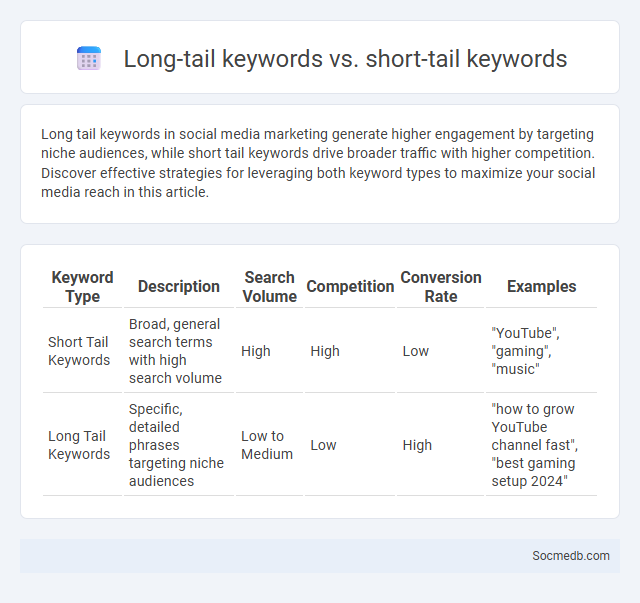
Photo illustration: long tail keywords vs short tail keywords
Long tail keywords in social media marketing generate higher engagement by targeting niche audiences, while short tail keywords drive broader traffic with higher competition. Discover effective strategies for leveraging both keyword types to maximize your social media reach in this article.
Table of Comparison
| Keyword Type | Description | Search Volume | Competition | Conversion Rate | Examples |
|---|---|---|---|---|---|
| Short Tail Keywords | Broad, general search terms with high search volume | High | High | Low | "YouTube", "gaming", "music" |
| Long Tail Keywords | Specific, detailed phrases targeting niche audiences | Low to Medium | Low | High | "how to grow YouTube channel fast", "best gaming setup 2024" |
Understanding Long Tail Keywords
Long tail keywords in social media target highly specific phrases your audience searches for, driving more qualified traffic to your content. Using these keywords increases engagement by matching users' precise interests and intentions, enhancing visibility across platforms like Instagram, Twitter, and Facebook. You can improve your social media strategy by analyzing long tail keyword trends to create relevant posts that boost reach and conversions.
Defining Short Tail Keywords
Short tail keywords in social media refer to broad, highly searched terms consisting of one or two words, such as "Instagram" or "Facebook marketing." These keywords drive significant traffic but face high competition due to their general nature and widespread use across platforms. Effective social media strategies leverage short tail keywords to increase visibility and attract large, diverse audiences.
What Is Metadata in SEO?
Metadata in SEO refers to the information embedded within a webpage's HTML that helps search engines understand the content and context of the page. Key types of metadata include title tags, meta descriptions, and header tags, which directly influence search engine rankings and click-through rates from social media platforms. Properly optimized metadata improves visibility and engagement by making content more relevant and accessible to both users and search engines.
Key Differences Between Long Tail and Short Tail Keywords
Long tail keywords are highly specific phrases with lower search volume but higher conversion potential, making them ideal for targeting niche audiences on social media platforms. Short tail keywords consist of broader, more general terms with higher search volume but intense competition, often used to increase brand visibility and reach. Understanding these key differences helps you optimize your social media content strategy to attract more qualified traffic and improve engagement.
Role of Metadata in Search Rankings
Metadata significantly influences search rankings on social media platforms by providing essential context about content, enabling better indexing and retrieval by algorithms. Accurate use of metadata, such as tags, descriptions, and categories, enhances content discoverability and relevance in user searches. Optimizing metadata improves visibility, driving higher engagement and traffic through targeted exposure.
Benefits of Using Long Tail Keywords
Long tail keywords in social media marketing enhance targeting accuracy by attracting niche audiences with specific interests, which leads to higher engagement rates and conversion potential. Utilizing these keywords improves search visibility on platforms like Instagram, Facebook, and Twitter, driving organic traffic from users who are closer to making a decision. Brands benefit from reduced competition and lower advertising costs by focusing on long tail keyword phrases tailored to their unique products or services.
When to Use Short Tail Keywords
Short tail keywords are best used when targeting broad and high-traffic topics on social media platforms, helping your content attract a wide audience quickly. Your goal is to increase visibility and engagement by incorporating popular, concise keyword phrases that people are actively searching for. This strategy works well for raising brand awareness and driving large volumes of traffic, especially during initial campaign phases or trending events.
How Metadata Enhances Keyword Strategy
Metadata plays a crucial role in enhancing keyword strategy by providing search engines with detailed information about social media content, improving visibility and relevance in search results. Optimizing metadata such as tags, descriptions, and titles ensures that posts are accurately categorized and targeted to specific audiences, increasing engagement and reach. Leveraging metadata enables marketers to analyze keyword performance and refine their strategies based on precise data insights from social media platforms.
Combining Long Tail, Short Tail Keywords, and Metadata
Combining long tail and short tail keywords in social media content enhances search engine visibility by targeting both broad and specific user queries. Incorporating relevant metadata such as hashtags, alt text, and descriptions further optimizes posts for platform algorithms and improves engagement rates. Integrating these elements strategically drives targeted traffic and boosts overall content discoverability.
Best Practices for Optimizing Keywords and Metadata
Optimizing keywords and metadata on social media involves conducting thorough keyword research to identify relevant terms with high engagement potential and integrating them naturally into profiles, posts, and hashtags. Crafting precise and compelling metadata, such as meta descriptions and alt text, enhances content discoverability and accessibility across platforms. Regularly updating keywords and metadata based on performance analytics ensures sustained visibility and improved ranking in social media search results.
 socmedb.com
socmedb.com